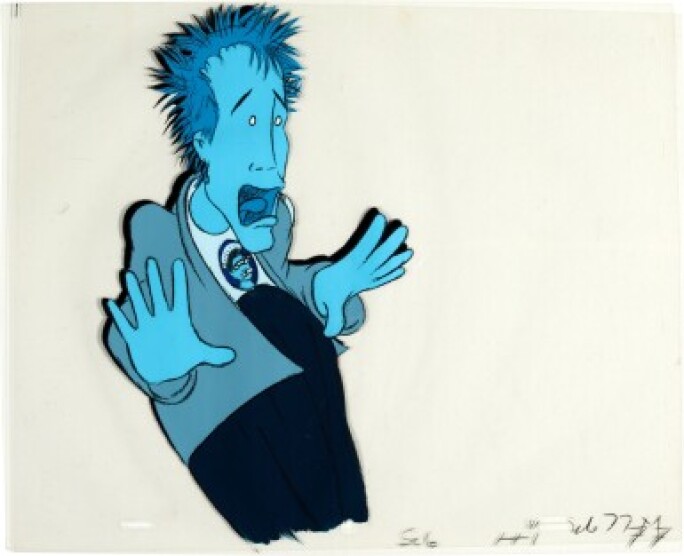T he Sex Pistols ignited the UK Punk movement with a unique mixture of caustic lyrics, urgent riffs, provocative visual imagery, youthful swagger, and amazing clothes. This autumn Sotheby’s will offer for sale a uniquely authoritative collection of original artwork, posters, manuscript lyrics, and ephemera, which together tell the remarkable story of Britain’s most notorious band.
- April 1976
- Spring 1976
- Spring 1976
- Summer 1976
- Autumn 1976
- 26 November 1976
- 1 December 1976
- Early 1977
- 27 May 1977
- 28 October 1977
- Early 1978
- 1979
- 1980
-
 Early PromotionMalcolm McLaren | Press release for the Sex Pistols, c. April 1976.
Early PromotionMalcolm McLaren | Press release for the Sex Pistols, c. April 1976.
Estimate: £600-£800
VIEW LOT HERE -
 "We’re not into music, we’re into chaos”: Early GigsHelen Wellington-Lloyd and Nils Stevenson | Handbill for the Nashville Rooms, 29 April 1976.
"We’re not into music, we’re into chaos”: Early GigsHelen Wellington-Lloyd and Nils Stevenson | Handbill for the Nashville Rooms, 29 April 1976.
Estimate: £600-£800
VIEW LOT HERE -
 “You better understand I’m in love with myself”: The First SongsJohnny Rotten | No Feelings, autograph manuscript lyrics, 1976
“You better understand I’m in love with myself”: The First SongsJohnny Rotten | No Feelings, autograph manuscript lyrics, 1976
Estimate: £15,000-£20,000
VIEW LOT HERE -
 Punk Attitude
Punk Attitude -
 Punk ImageryJamie Reid | Original collage used for the Glitterbest office 'gone for lunch' sign, Autumn 1976.
Punk ImageryJamie Reid | Original collage used for the Glitterbest office 'gone for lunch' sign, Autumn 1976.
Estimate: £12,000-£15,000
VIEW LOT HERE -
 The First SingleJamie Reid | Anarchy in the UK, promotional poster, owned by Sid Vicious.
The First SingleJamie Reid | Anarchy in the UK, promotional poster, owned by Sid Vicious.
Estimate: £3,000-£5,000
VIEW LOT HERE -
 "The Filth and the Fury”: The Sex Pistols find new notoriety with a foul-mouthed television appearanceJamie Reid and Sophie Richmond | Sex Pistols Bulletin for Anarchy in the UK!, December 1976
"The Filth and the Fury”: The Sex Pistols find new notoriety with a foul-mouthed television appearanceJamie Reid and Sophie Richmond | Sex Pistols Bulletin for Anarchy in the UK!, December 1976
Estimate: £600-£800
VIEW LOT HERE -
 Sid Vicious Joins The Band
Sid Vicious Joins The Band -
 Sex Pistols and the Silver JubileeJamie Reid | God Save the Queen, promotional poster, owned by Sid Vicious.
Sex Pistols and the Silver JubileeJamie Reid | God Save the Queen, promotional poster, owned by Sid Vicious.
Estimate: £4,000-£6,000
VIEW LOT HERE -
 The AlbumNever Mind the Bollocks, promotional poster, owned by Sid Vicious.
The AlbumNever Mind the Bollocks, promotional poster, owned by Sid Vicious.
Estimate: £5,000-£7,000
VIEW LOT HERE -
 The Doomed US Tour Leads To the Band’s Dramatic DissolutionWarner Bros/Jamie Reid | Press kit with Never Mind the Bollocks t-shirt, 1977.
The Doomed US Tour Leads To the Band’s Dramatic DissolutionWarner Bros/Jamie Reid | Press kit with Never Mind the Bollocks t-shirt, 1977.
Estimate: £1,200-£1,600
VIEW LOT HERE -
 Flogging a Dead Horse: the Afterlife
Flogging a Dead Horse: the Afterlife -
 The Great Rock n Roll SwindleHirsch and Jamie Reid | The Great Rock 'n' Roll Swindle, promotional poster, 1980.
The Great Rock n Roll SwindleHirsch and Jamie Reid | The Great Rock 'n' Roll Swindle, promotional poster, 1980.
Estimate: £300-£500
VIEW LOT HERE

The Posters

The Handbills

“It was bigger than art”: Malcolm McLaren

The Stolper-Wilson Collection, as told by Stolper and Wilson
The Stolper Wilson Collection was formed by us over about 15 years of active collecting between 1990 and about 2004. In the early 1990s we were both already deeply involved in contemporary art – Paul as an art dealer and Andrew as an art critic, art historian and curator. We were both out and about, haunting galleries, artists’ studios, shops, street markets and auction rooms around London. In 1991 we were at Christie’s South Kensington viewing a great Patrick Caulfield painting we couldn’t afford within an otherwise rather lacklustre sale of modern British art and decided to explore what else was on view. In the large rooms at the back of the building a rock and pop sale had just opened for viewing, and we were brought up short by a small group of Sex Pistols items. Aged 14 in 1976, Andrew was at a perfect age to be swept up in the excitement of punk (albeit outside London in Hertfordshire) and God Save the Queen and, later, Sid Vicious’s My Way, remained talismanic records for him. Paul, a bit younger, had grown up in Sloane Square at the top of the King’s Road, the centre of the emerging punk scene in London.
'The SEX PISTOLS are like some contagious disease – UNTOUCHABLE!'
What we saw that day at Christie’s unlocked something opportune for both of us. It wasn’t nostalgia or memorabilia that we saw, instead we recognized we were looking at complex and great artworks. What we bought then is still in the collection – a union jack card flag bunting overprinted by Jamie Reid coinciding with the release of God Save the Queen during the 1977 Silver Jubilee.
There was here a graphic directness. The imagery – the flag and an official portrait of the Queen – was utterly familiar but presented, altered and reversed in such a way that pulled the rug from under the feet of the banal heraldry of establishment norms that provided its source material. The coding here – as for much of the graphic work produced for the Sex Pistols – at first resisted being unlocked. Its meaning was both subversive and ambiguous. Understanding the slippages of graphic meaning encouraged us to investigate the iconography and graphic identity of punk as it was formed in relation to the Sex Pistols. This was a collaborative and artistic venture steered largely by Malcolm McLaren and Vivienne Westwood with Jamie Reid, Nils and Ray Stevenson, Helen Wellington-Lloyd, the band and its earliest supporters and fans. The best of Reid’s designs didn’t sell product (a point of friction with the record companies the band was signed to) but rather embodied an attitude about being in the world.
Malcolm McLaren’s intention and ambition was ultimately artistic – in many ways, both visually and sonically, he set out to change the way we understand the world; how we ‘feel’ and exist in the world. In 1996 we staged a small exhibition at the gallery above the Eagle pub in Farringdon in London. At this event we asked McLaren if his activities as manager of the Sex Pistols constituted the fruits of an art practice. He replied that he thought they could. Momentarily reflecting on his answer, he then emphasised that ‘it was always an art thing’, before finally after another pause declaring that ‘it was bigger than art’. Almost fifteen years earlier he had uncompromisingly declared, ‘I’m an artist. I am. I always was and I always will be.’
One key constituent of McLaren’s toolbox as an artist was his identification with the Situationist renewal of Surrealism in the 1960s. Understood alongside the identity of the Sex Pistols and that wider culture of refusal, characterised as punk, the Situationist concern with the politics of everyday life in redirecting an aesthetics of boredom equates with McLaren’s ambition to turn spectacle into situation.
With our collection, we set out to examine the nature of the creation of a punk identity and ethos through the Sex Pistols by unlocking the specific meanings of the visual images and attitudes that were at its heart. These had been created through a layered and collaged mix of media and attitude within a collaborative matrix that today still carries great power through its challenge to social and cultural orthodoxies. The Sex Pistols was more than just a band and suggested how punk was not just about music but fed into and changed society. Our collection provides an indication of how the worlds of music and graphic design collided to create art of enduring potency.
Among our personal highlights are the unique working lyrics for Holidays in the Sun . This captures the song as it is being formed, equating the holiday of everyday life with a prison to be escaped from. Jamie Reid’s posters for the song reveal how the song’s content was communicated visually through subversive alteration of a Belgian tourist poster or one showing a grim image of holidaymakers crowded together on a beach from which there would be little escape.
Surviving original collages by Jamie Reid from this period are rare – doubly so when they have the history of I Hate French Cooking – the gone for lunch sign that was posted on the door of McLaren’s Glitterbest office during the lunch hour. The enduring image of Delacroix’s figure of Marianne embodying Liberty and the rebirth of a French culture and society at a time of revolution becomes here re-identified as a Sex Pistol (deploying an early use of his ransom-lettered logo for the band).
Malcolm McLaren’s antics trumped the music industry by refusing to play along with its games: ‘When I’m older and people ask me what I used to do for a living I shall have to say: I WENT IN AND OUT OF OFFICES GETTING PAID FOR IT! IT’S CRAZY!!!’ This sums up his success in turning the spectacle of business into a situation of his own making – creating a marker for the essential punk strategy of DIY, ‘Do It Yourself’. His handwritten statement creates an enduring frame for the band’s history.
In the first press release produced for the band in 1976, McLaren stated that the Sex Pistols’ ‘spontaneity and honesty threatens all the highly packaged pop of the past’. The band’s authentic voice was a huge aspect of its success. Two years later John Lydon refused to take an active part in the film the Great Rock n Roll Swindle, as a result McLaren decided to construct a small number of animated sequences to aid in the reconstruction of the story of the Sex Pistols (lot nos. 59-65). Apart from short sequences of concert footage Johnny Rotten only appears in the film as an animated cartoon character.
Our collection unlocks the image strategies that went into the creation of art whose legacy is still powerfully felt today. The collection also tells a story about the short life of the band itself. One of the most poignant of these concerns Sid Vicious and his final tragic last months in New York living at the Chelsea Hotel during the winter of 1978 and 1979 – a period that is summoned up by the poster of Never Mind the Bollocks, Here’s the Sex Pistols that hung on his wall there. For many Sid Vicious embodied what it was to be a Sex Pistol – the archetypal punk. Malcolm McLaren had declared that ‘if Johnny Rotten is the voice of punk, then Vicious is the attitude’.
- Paul Stolper and Andrew Wilson, London, September 2022
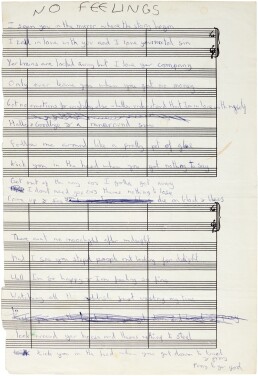



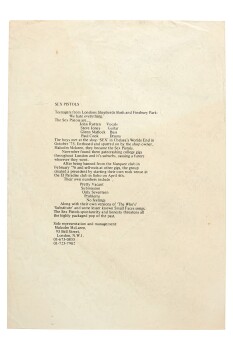












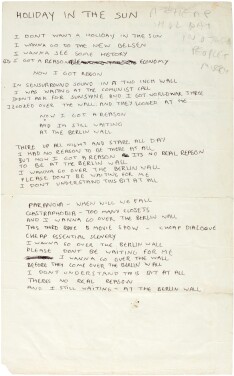




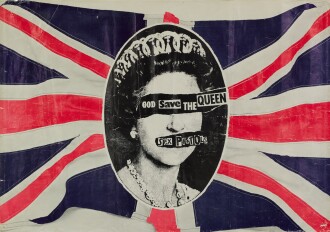




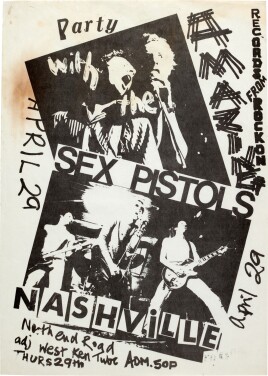
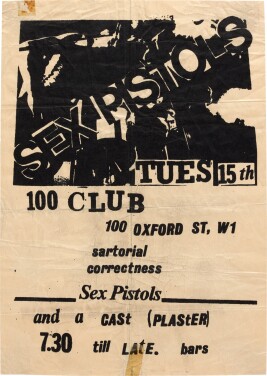




![View 1 of Lot 25: Malcolm McLaren | Handwritten statement in black ink, [1977]](https://sothebys-com.brightspotcdn.com/dims4/default/e0c376f/2147483647/strip/true/crop/2000x1416+0+0/resize/330x234!/quality/90/?url=https%3A%2F%2Fsothebys-md.brightspotcdn.com%2Ff9%2Fed%2Fccaf740d43f79e3eb8714fa8dc5e%2Fl22727-c82q6-01.jpg)










